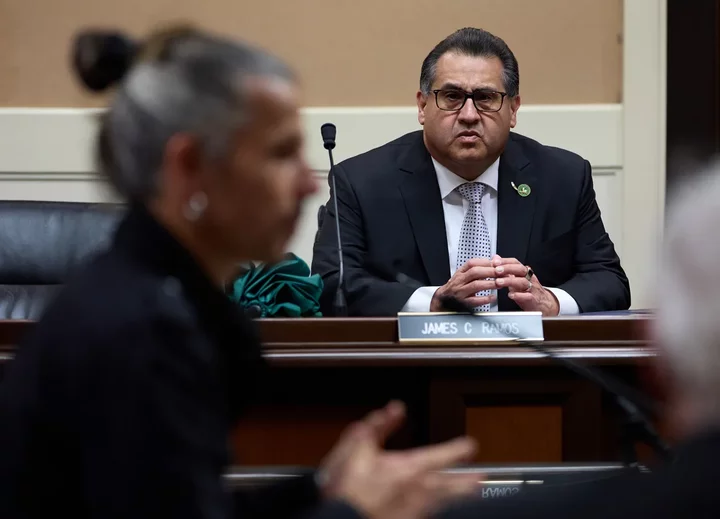Assemblymember James Ramos, part of the Select Committee On Happiness And Public Policy Outcomes, listens to a speaker during an informational hearing at the state Capitol in Sacramento on March 12, 2024. Photo by Fred Greaves for CalMatters
For many domestic violence victims in California, the danger doesn’t end when their abuser is sentenced to prison. Instead, it becomes a waiting game until the assailant is released.
Assemblymember James Ramos, a San Bernardino Democrat, wants California to institute a six-month safety net for survivors by issuing temporary protective orders that restrict contact during that critical window.
His proposal, Assembly Bill 285, aims to close the gap between the time a defendant is released and the victim secures a permanent restraining order.
“By issuing a criminal protective order, we ensure that upon an offender’s release, they cannot gain contact with those whom they victimized,” Ramos said. “This is especially important when it comes to Missing and Murdered Indigenous Persons as many of those cases stem from domestic violence.”
Last year Ramos passed a related bill, AB 2695, which requires the state Department of Justice to track criminal incidents involving missing and murdered Indigenous People, and to record whether domestic violence incidents took place on tribal land. California tribes have been pushing for an emergency declaration to help address the high rate of unsolved cases that often stem from domestic violence.
Currently in California, restraining orders can expire before someone convicted of domestic violence is released, leaving victims scrambling.
“Survivors often live in fear of facing an eventual prison release date and potential contact with the offender,” San Bernardino County District Attorney Jason Anderson, a co-sponsor of the bill, said in a statement.
Ramos’ bill would require a six-month restraining order to take effect before an abuser is released. Supporters hope this would give the survivor time to get permanent protective orders, said Riverside County District Attorney Mike Hestrin, who is also a co-sponsor of the bill.
Under a temporary order, a judge could forbid communication with a victim, prevent the defendant from annoying, harassing, threatening or harming the victim, and order law enforcement agencies to provide protection for victims and their family members, the bill states.
Susanna Barnett, executive director of Morongo Basin Unity Home, a nonprofit that serves people who have experienced domestic violence in Yucca Valley, said it’s a real worry for her clients.
“When the abuser has been released he or she might be angry because they put them in jail or prison,” Barnett said. “They feel like it’s the victim’s fault that they called the police or put a restraining order on them. It’s very common.”
When abusers come back, she said, “It is worse…They feel that they’ve lost that control so they escalate to physical violence.”
She said judges sometimes deny restraining orders when a defendant has been in prison for a long time and no new offenses have occurred.
“If nothing has happened then they won’t grant the restraining order, which is kind of an oxymoron, because we want these people to be safe,” Barnett said.
###
CalMatters.org is a nonprofit, nonpartisan media venture explaining California policies and politics.

CLICK TO MANAGE